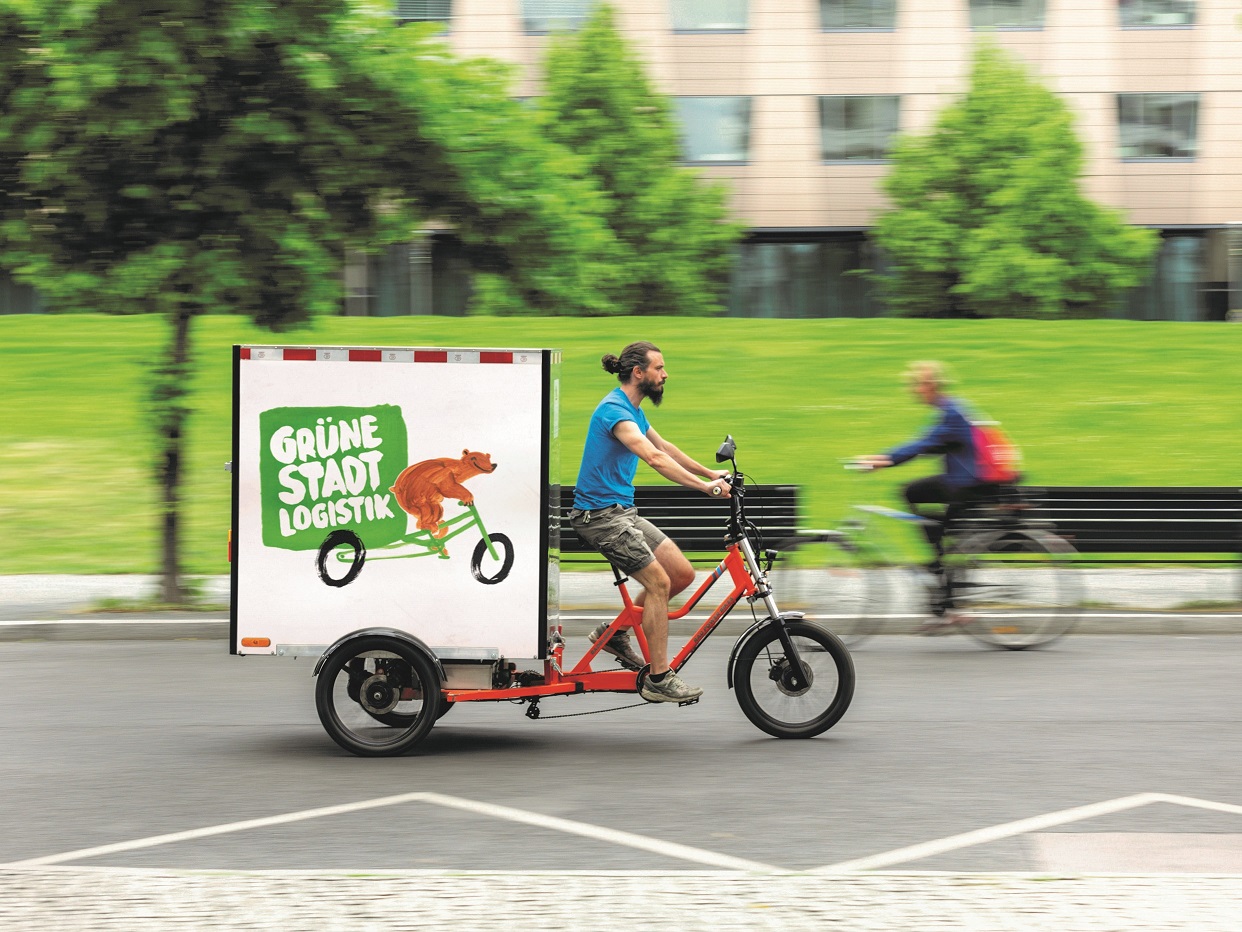Zukunftsangelegenheiten GmbH - Deliveries without congestion or emissions

The company Zukunftsangelegenheiten GmbH from Wustermark operates a digital platform called Grüne Stadtlogistik (green urban logistics). Deliveries from various shippers in the organic food sector are coordinated on this platform and delivered in Berlin from central micro-hubs using e-vehicles, such as cargo bikes, to cover the ‘last mile’ to the doorstep.
A click of the ‘Buy’ button is all it takes today to have products delivered with no fuss to your home. This click sets an entire chain of logistical processes in motion. Due largely to the increase in countless, small parcel deliveries to private households, we are also seeing an increase in unpunctual deliveries, fine dust pollution and noise due to denser traffic and an ever-higher number of stops. What’s more, pressure on overworked suppliers is increasing and working conditions are deteriorating.
In order to make this ‘last mile’ to the customer’s front door emission-free, sustainable and as efficient as possible, Zukunftsangelegenheiten GmbH has developed a digital logistics network called Grüne Stadtlogistik. The platform’s digital infrastructure was implemented with funding from the European Regional Development Fund (ERDF).
Less diesel, more muscle power
Anyone in the centre of Berlin who wants to order regional fresh organic food from Brandenburg, for instance, from Landkorb GmbH or the Brodowin eco-village, can now have it delivered to his or her home by electric cargo bike. This is all made possible by the Grüne Stadtlogistik logistics network developed by Zukunftsangelegenheiten GmbH. The starting point was the desire to establish a comprehensive bicycle logistics system in the centre of Berlin rather than small isolated solutions.
And this is how it works: Customers place their orders with the individual organic food suppliers. The suppliers forward the delivery address and order data, such as size and weight of the shipment, to the Grüne Stadtlogistik platform. With the help of a routing algorithm, the stops of the individual shippers are collected and optimised in order to identify the shortest routes. The shipper is then notified about which micro-hub they should deliver the goods to. Using their electric vehicles, the bike companies in the network then pick up the goods weighing up to 250 kgs from these inner-city transshipment points. The exact delivery time to the door is planned via an app and communicated to the shippers via the platform.
The future of transport mobility?
The last mile accounts for 25 % of all urban transport-related carbon emissions. According to some studies, up to 50 % of urban delivery traffic could be handled with electric vehicles or cargo bikes instead of motorised delivery vehicles. The Grüne Stadtlogistik network is paving the way for this change to green mobility in the transport sector, which not only protects the environment but also promotes the quality of life in urban areas.
For further information, visit www.grünestadtlogistik.de
A click of the ‘Buy’ button is all it takes today to have products delivered with no fuss to your home. This click sets an entire chain of logistical processes in motion. Due largely to the increase in countless, small parcel deliveries to private households, we are also seeing an increase in unpunctual deliveries, fine dust pollution and noise due to denser traffic and an ever-higher number of stops. What’s more, pressure on overworked suppliers is increasing and working conditions are deteriorating.
In order to make this ‘last mile’ to the customer’s front door emission-free, sustainable and as efficient as possible, Zukunftsangelegenheiten GmbH has developed a digital logistics network called Grüne Stadtlogistik. The platform’s digital infrastructure was implemented with funding from the European Regional Development Fund (ERDF).
Less diesel, more muscle power
Anyone in the centre of Berlin who wants to order regional fresh organic food from Brandenburg, for instance, from Landkorb GmbH or the Brodowin eco-village, can now have it delivered to his or her home by electric cargo bike. This is all made possible by the Grüne Stadtlogistik logistics network developed by Zukunftsangelegenheiten GmbH. The starting point was the desire to establish a comprehensive bicycle logistics system in the centre of Berlin rather than small isolated solutions.
And this is how it works: Customers place their orders with the individual organic food suppliers. The suppliers forward the delivery address and order data, such as size and weight of the shipment, to the Grüne Stadtlogistik platform. With the help of a routing algorithm, the stops of the individual shippers are collected and optimised in order to identify the shortest routes. The shipper is then notified about which micro-hub they should deliver the goods to. Using their electric vehicles, the bike companies in the network then pick up the goods weighing up to 250 kgs from these inner-city transshipment points. The exact delivery time to the door is planned via an app and communicated to the shippers via the platform.
The future of transport mobility?
The last mile accounts for 25 % of all urban transport-related carbon emissions. According to some studies, up to 50 % of urban delivery traffic could be handled with electric vehicles or cargo bikes instead of motorised delivery vehicles. The Grüne Stadtlogistik network is paving the way for this change to green mobility in the transport sector, which not only protects the environment but also promotes the quality of life in urban areas.
For further information, visit www.grünestadtlogistik.de

